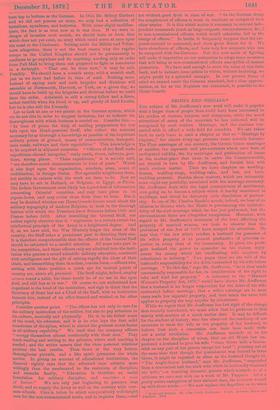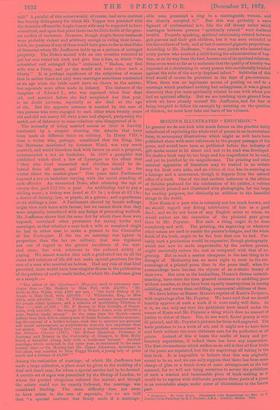BRIDES AND BRIDALS.*
THE subject of Mr. Jeaffreson's new work will make it popular with a larger class of people than could have been interested in his studies of doctors, lawyers, and clergymen, while the novel attractions of many of the materials he has collected will be recognised by most readers. Marriage, ani the customs con- nected with it, afford a wide field for anecdote. We are taken back to early times in such a chapter as that on " Marriage by Capture ;" but almost every age presents some notable features. The Fleet marriages of one century, the Gretna Green marriages of another, the espousals and pre-contracts which once were of undisputed validity, the lay marriages and publication of banns in the market-place that came in under the Commonwealth, are treated in turn by Mr. Jeaffresou, and furnish him with much curious matter. Then we have chapters on wedding- dresses, wedding-rings, wedding-cake, and last, not least, wedding-presents. Besides these matters, which are intimately. some might say painfully, associated with the marriage ceremony. Mr. Jeaffreson deals with the legal consequences of matrimony, even going on to discuss a subject which is hardly mentioned at weddings, and which he delicately calls dissolution of partner- ship. In one of Mr. Charles Reade's novels, indeed, we hear of an allusion to divorce while the Maire is proclaiming the indissolu- bility of the civil marriage which he has just performed, but the circumstances there are altogether exceptional. Moreover, with regard to Mr. Jeaffreson's statement of the laws affecting the property of married women, we have to observe that the provisions of the Act of 1870 have escaped his attention. 1-le says that " the law which renders a husband the possessor of his wife's property is at present productive of grievous in- justice in every class of the-community. It gives the profli- gate husband the power to squander on his vicious enjoy- ments the money which his unoffending wife acquires by inheritance or industry." Two pages later we are told of the husband's responsibility for the debts contracted by his wife before marriage. " To this day," says Mr. Jeaffreson, " he is thus made commercially responsible for her, in consideration of his right to take and hold her property." A reference to the "Married Women's Property Act, 1870," would have shown Mr. Jeaffreson that a husband is no longer responsible for the debts of his wife contracted before marriage ; that a wife's earnings are in most cases made her separate property, and that much the same rule applies to property she may acquire by inheritance.
While we regret that Mr. Jeaffreson has lost sight of the change thus recently introduced, we must allow that he professes to deal mainly with matters of a much earlier date. It may be difficult for the student of history, who has observed the tendency of our ancestors to treat the wife as the property of her husband, to believe that such a concession can have been made with- out a social revolution. Mr. Jeaffreson reminds us in his chapter on the discipline of wives, that an old Welsh law em- powered a husband to give his wife " three blows with a broom- stick on any part of her person except her head "; pointing out at the same time that though the punishment was limited to three blows, it might be repeated as often as the husband thought fit. "The Anglo-Saxon husband," says Mr. Jeaffreson, "suspended from a convenient nail the stick with which he habitually chastised his wife ;"—a touching domestic picture which reminds us of a criticism we once met with on a work of Mr. Tupper's. After a pretty severe castigation of that eminent man, the reviewer wound up with these words,—" We now replace the flagellum on its usual
* Brides and Bridals. By John Cordy Jeaffreson. 2 vols. London: 'fund and Blackett. 1872.
" The editor of the Gentleman's Magazine used to announce mar-
riages thus Mr. Baskett to Miss Pell, with £5,000 ; " Mr. Davis to Mrs. Wylds, with £400 per ann.;' ' the Lord Bishop of St. Asaph to Miss Orel], with £30,000; "J. Whitcombe, Esq., to Miss Allen, with £40,000;' Mr. N. Tillotson, the eminent preacher among the people called Quakers, and a relative of Archbishop Tillotson, to Miss —, with £7,000 ;" Mr. P. Bowen to Miss Nicholls, of Green- hithe, with £10,000 ;" Sir George C. to Widow Jones, with £10,000 a year, besides ready money." At the same time the Scotch—more gallant than their fellow-countrymen of South Britain—whilst announc- ing the amount of a bride's fortune, used also to mention her personal and moral endowments, as qualifications scarcely less important than her money. 'On Monday last,' runs a matrimonial announcement in the Glasgow Courant (1747), 'Dr. Robert Hamilton, Professor of Anatomy and Botany in the University of Glasgow, to Miss Molly Baird, a beautiful young lady with a handsome fortune.' Another marriage, which occurred in the samo year, is announced in the samo journal thus :---` On Monday last Mr. James Johnstone, merchant in this place, was married to Miss Peggy Newall, a young lady of great merit, and a fortune of £4,000.' " Among the curiosities of marriage, of which Mr. Jeaffreson has made a large collection, a place must be given to the wedding of a deaf and dumb man, for whom a special service had to be devised. A certain set of signs was prescribed by the Bishop of London, to whom the puzzled clergyman referred the matter, and though the rubric could not be exactly followed, the marriage was considered binding. The same difficulty does not seem to have arisen in the case of espousals, for we are told that " a spousal contract was firmly made if a marriage-
nail." A parallel of this nature would, of course, lead us to contrast the literary delinquency•for which Mr. Tupper was punished with the domestic offence the Anglo-Saxon wife may be supposed to have committed, and upon that point there can be little doubt of the gene- ral verdict of reviewers. However, though Anglo-Saxon husbands were probably violent and arbitrary enough in ruling their house- holds, we question if any of them would have gone so far as that Duke of Somerset whom Mr. Jeaffreson holds up as a pattern of outraged
propriety. The Duke's second wife on one occasion ventured to put her arm round his neck and give him a kiss, on which "the astonished and outraged Duke " exclaimed, " Madam, my first wife was a Percy, and yet she would not have taken such a liberty." It is perhaps significant of the subjection of women that in earlier times not only were marriages sometimes contracted at an age when the bride could have no choice in the matter, but espousals were often made in infancy. The instance of the daughter of Edward I., who was espoused when four days old, and married before she had completed her first year, is no doubt extreme, especially as she died at the age of six. But the opposite extreme is reached by the case of two persons who were engaged to each other when twenty years old and did not marry till sixty years had elapsed, postponing the match out of deference to some relations who disapproved of it.
The necessity of being married sooner or later is forcibly inculcated by a chapter showing the attacks that have been made at different times on celibacy. In Henry VII1.'s time a writer who, perhaps, considered that the King, like the Mormons mentioned by Artemus Ward, was very much married, and would therefore look with favour on such a proposal, recommended a tax on bachelors. In 1690 a pamphlet was published which cited a law of Lycurgus to the effect that " they who lived unmarried and childless should be de- barred from all sports, and forced to go naked in the winter about the market-place." Five years later Parliament imposed a tax on bachelors varying with the social standing of each offender. An unmarried Duke, after attaining the age of twenty-five, paid £12 10s. a year. An archbishop had to pay a shilling more ; a bishop was taxed at £5 le. ; a dean at £2 lls ; a doctor of divinity, law, or physic, at a guinea ; and a gentleman at six shillings a year. A Parliament elected by female suffrage might view such taxes with favour, but we cannot think that they were originally introduced with any design of promoting wedlock. Mr. Jeaffreson shows that the same Act by which these dues were imposed, contained other provisions for taxing births and marriages, so that whether a man took a wife or remained single he had in either case to make a present to the Chancellor of the Exchequer. If the tax on marriage was lighter in proportion than the tax on celibacy, that was regulated not out of regard to the greater excellence of the mar- ried state, but with reference to the reduced ability of paying. We almost wonder that such a graduated tax on all the states and relations of life did not make special provision for the case of a man who married an heiress. Had any rule of that kind prevailed, there would have been singular fitness in the publication of the portions of newly-made brides, of which Mr. Jeaffreson gives us a sample :— able man presented a ring to a marriageable woman, and she silently accepted it." But this was probably a mere figment of ecclesiastical law, like the old theory under which marriages between persons " spiritually related " were declared invalid. Properly speaking, spiritual relationship existed between god-parents and their god-children, but it was soon extended to the descendants of both, and at last it assumed gigantic proportions. According to Mr. Jeaffreson, " there were jurists who insisted that every person who touched a child during the administration of bap- tism, or on its way from the font, became one of its spiritual relations. Some even went so far as to maintain that the quality of kinship was imparted at a christening to every person who accidentally brushed against the robe of the newly-baptised infant." Subtleties of this ) kind would of course be prevalent in the days of pre-contracts. When there was no legitimate means of putting an end to a marriage which produced nothing but unhappiness, it was a grand discovery that you were spiritually related to one with whom you had no spiritual affinity. But we are touching upon ground from which we have already warned Mr. Jeaffreson, and for fear of being tempted to follow his example by entering on the question of divorce, we must here take our leave of his volumes.







































 Previous page
Previous page